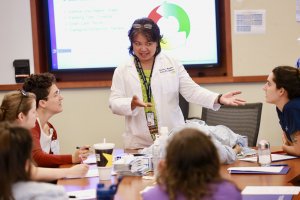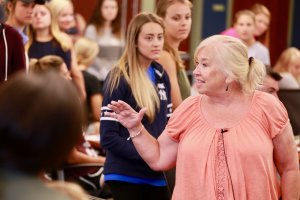Bringing Nursing Curriculum to Life at the School of Nursing

At Duke, we bring curriculum to life for our students to help make connections between theory, practice and improving care for those we serve. In one of our ABSN courses, Gerontological Nursing—Caring for Older Adults and their Families, students learn about caring for an aging population and helping patients’ caregivers. Faculty employ three unique approaches to engage the minds and hearts of our students as they learn to care for vulnerable elders and their families. The first, practical application, includes training from the Duke Elder Family Caregiver Training Center. The second, experiential learning, is taught with real-life role-playing and simulations for dementia and Alzheimer’s patients. The third, and arguably the most unique, is creative and artistic expression and explanation, allowing caregivers and patients to find common grounds for communication.
As the baby boomer generation ages into their 70s and 80s, more of nursing’s charge will include geontological care. This shift will affect nearly all aspects of nursing from patient interaction to training home caregivers on how to help their loved ones who are suffering from age-related ailments such as dementia.
 In a unique intraprofessional partnership, Duke ABSN faculty collaborated with the Duke Elder Family Caregiver Training Center (DEFT) to teach students how to train caregivers of elderly patients once they leave the hospital. The DEFT Center, directed by Cristina Hendrix, PhD, RN, FAAN, prepares and empowers individuals in their role as caregivers of homebound older adults especially during challenging transitions. The DEFT Center funded by a $1.5 million, three-year grant from the Duke Endowment. The Center provides an academic-medical-community model for assisting caregivers following hospital discharge, and is entering its third year of service.
In a unique intraprofessional partnership, Duke ABSN faculty collaborated with the Duke Elder Family Caregiver Training Center (DEFT) to teach students how to train caregivers of elderly patients once they leave the hospital. The DEFT Center, directed by Cristina Hendrix, PhD, RN, FAAN, prepares and empowers individuals in their role as caregivers of homebound older adults especially during challenging transitions. The DEFT Center funded by a $1.5 million, three-year grant from the Duke Endowment. The Center provides an academic-medical-community model for assisting caregivers following hospital discharge, and is entering its third year of service.
“We received a training session from DEFT that consisted of four stations, including central lines, wound care, family caregiver support and GI tube feedings,” says Hannah Milken, ABSN student. “We will be able to pass along the information we’ve learned to caregivers and their families that we will be interacting with in the future.”
The training students receive from DEFT helps prevent hospital readmissions and/or stays in assisted living centers. It also gives students real-world insight toward elder care and caregiver training.
“This training is a component in our gerontology course so that we may pass on the knowledge we gain on learning to be caregivers for elderly patients while in the hospital,” says Mumta Hannan, ABSN student. “We want to be able to provide these same skills and knowledge to caregivers when they go home with their loved ones.”
Another way ABSN faculty is bringing gerontology curriculum to life is through highlighting how Duke nurses become leaders in their fields.
 ABSN students met with Melanie Bunn, MSN ’93, a nurse practitioner who has worked in geriatrics since 1983 in hospitals and long-term care facilities. Bunn is an expert in Alzheimer’s and dementia. She teaches Duke’s future nurses how to care for patients in real-world scenarios. As an alumna of DUSON’s first adult gerontology nurse practitioner cohort, Bunn says “it’s great to be back home with students and talk about something that is critically important.”
ABSN students met with Melanie Bunn, MSN ’93, a nurse practitioner who has worked in geriatrics since 1983 in hospitals and long-term care facilities. Bunn is an expert in Alzheimer’s and dementia. She teaches Duke’s future nurses how to care for patients in real-world scenarios. As an alumna of DUSON’s first adult gerontology nurse practitioner cohort, Bunn says “it’s great to be back home with students and talk about something that is critically important.”
“The skills I’m teaching are critically important because in all settings of health care, nurses are seeing more patients with dementia,” says Bunn. “I’m trying to help students develop skills…by changing the way they start an interaction and by the way they engage and connect with people. As clinicians we need to find a way to change our approach and understand the patients better.”
Bunn’s teaching is part of a team-based approach that includes family members and other informal care partners to provide better care to their loved ones.
Also part of the Gerontological Nursing—Caring for Older Adults and their Families course, students take part in the Reflections Program at the Nasher Museum of Art. This program allows people who have dementia and their caregivers to experience art with free discussion and without time constraints.
“Through the Reflections Program, students are learning a different approach to working with patients with problems such as dementia and Alzheimer’s disease,” says Deirdre Thornlow, PhD, RN, CPHQ, assistant professor. Studies have shown that art can boost cognitive function and now it may provide future nurses with a non-judgmental, creative way to relate to patients.
The program provides students with ideas for how to interact with patients who are experiencing age-related decline and the Museum’s art provides a subject matter for them to interact.
“The partnership between the Nasher Museum of Art and the Duke School of Nursing is a new and successful approach to connecting with dementia patients,” says Jill Brennan-Cook, DNP, RN, CNE, assistant professor. “Students had an opportunity to view the art, see the colors and take note of how it made them feel. After viewing the art, students and faculty had a discussion on how the reflection experience can positively impact nursing practice for this special population.”
“We had a variety of interactive guest speakers in this course,” says Kelsey Carlin, ABSN student. “They were all very engaging and walked us through the various steps in taking care of patients with dementia and other end-of-life health outcomes. This course did a good job of starting from the beginning and building on skills throughout the semester, I feel much better prepared to work with the gerontological population after this course.”
Providing opportunities such as DEFT training, sessions with leaders in gerontology and the Reflections Program, the ABSN program develops critical thinking and engagement skills that prepare our students not only for being nurses today, but becoming nursing’s leaders tomorrow.